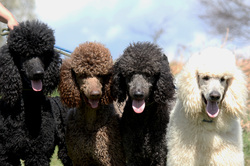Health Concerns Facing the Poodle

Regus Hugo Louis Samson
Like all purebred dogs, poodles are subject to some genetic weaknesses. As a breeder we carefully mate the animals to pass along the traits they are trying to achieve, unwanted traits are often passed along as well. Part of good poodle care is knowing the main health concerns facing your poodle and being ready to address them.
Hip Dysplasia ...Occurs when the head of the femur does not fit properly into the hip socket. This condition causes pain and lameness. It can be treated with analgesics (pain killers) and surgery
Degenerative Myelopathy...
.Canine degenerative myelopathy (DM) is an uncommon, progressive degenerative disease that causes hind limb weakness and paralysis and eventually affects the front limbs, as well. The symptoms of DM start gradually, usually in adult dogs over 5 years of age. Early in the course of the disease, affected dogs will start to lose muscle coordination and balance in their rear legs (ataxia). They will develop slight or incomplete hind end paralysis (paraparesis), which will progress to total rear end paralysis (paraplegia), accompanied by varying degrees of urinary and/or fecal incontinence. As the dog loses its ability to stand and use its hind legs, it may develop bed sores and wounds from urine scalding, which can be extremely painful. It usually takes somewhere between 6 and 12 months for full pelvic paralysis to develop in dogs with DM. The front legs will be affected next, starting with lack of coordinated movement (ataxia) and progressing to complete paralysis. The ability to chew and swallow can also be affected. When all 4 legs are paralyzed, the condition is called “tetraplegia.” Tetraplegia usually occurs within several years of the diagnosis. The dog’s sensory perception abilities are unaffected by this disease, and most affected dogs do not suffer from pain.
Progressive Retinal Atrophy...
Progressive Retinal Atrophy (PRA) is a genetic disease resulting in the progressive loss of function of the rods and cones in the retina (also called Progressive Rod Cone Dysplasia or prcd). In poodles, this seems to occur after 1 year of age (in some dogs it can happen as a pup) and is known to always be bilateral and resulting in blindness. This is not an immediate loss of vision, and because dogs adjust so well through heightening of other senses and a familiarity with their typical surroundings, the disease may not be appreciated by the family until quite progressed, making one think the course was rapid.
Inherited Eye Conditions.....By screening breeding stock for these diseases, breeders can use the information to eliminate or reduce the frequency of eye disease being passed on to puppies. - See more at: http://www.thekennelclub.org.uk/health/breeding-for-health/complex-inherited-disorders/bvakc-health-schemes/bvakcisds-eye-scheme/#sthash.ishkNfTG.dpuf
Sebaceous Adenitis...This is a chronic skin problem that occurs when the sebaceous glands are abnormal or sometimes altogether absent. Symptoms include hair loss, a scaly look to the skin, and multiple skin infections. The treatment includes therapeutic baths as well as antibiotics to treat the infections.
Addisons Disease (Hypoadrenocorticism)... Addison's disease is characterized by insufficient production of glucocorticoid and/or mineralocortoid in the adrenal cortex (by the kidneys). Addison's is often undiagnosed because early symptoms are vague and easily mistaken for other conditions. Standard poodles with unexplained lethargy, frequent gastric disturbances, or an inability to tolerate stress should be tested for Addison's. Addison's can cause fatal sodium/potassium imbalances, but, if caught early and treated with lifelong medication, most dogs can live a relatively normal life.
Bloat (GDV - gastric dilation and volvulus).... Excess gas trapped in the dog's stomach causes "bloat." Twisting of the stomach (volvulus or "torsion") causes or is caused by excess gas. Symptoms include restlessness, inability to get comfortable, pacing, or retching without being able to bring up anything. The dog's abdomen may be visibly swollen, but dogs can bloat or torsion without visible swelling. A dog with GDV requires immediate veterinary care. The dog's survival usually depends on whether the owner can get to a vet in time.
Von Willebrands Disease...A bleeding disorder much like hemophilia
Renal dysplasia....Juvenile renal dysplasia (JRD) is an important category of kidney diseases in canines. Dysplasia is defined as abnormal growth or development of cells or organs.
With all these health concerns inherent to the poodle, good poodle care means regular visits to the vet
Amelogenesis imperfecta....Clinically affected dogs present with discolored teeth
A breed predisposition has been noted in the Standard Poodle..
.http://www.vetbook.org/wiki/dog/index.php/Amelogenesis_imperfecta
http://www.kaossiberians.com/old%20kaos%20pages/health/Vaccinations%20Bloat%20Seizures%20Subclinical%20Cases%20of%20Distemper.pdf
http://www.ncbi.nlm.nih.gov/m/pubmed/20192019/
At Argentcymru we test for the following
Hip Dysplasia and Elbow Score...http://www.bva.co.uk/public/documents/Interpretation-and-_use-of-BVA-KC_Hip-Scores.pdf
Bva/kc yearly eye test.... http://www.bva.co.uk/canine_health_schemes/Eye_Scheme.aspx
Sebceous Adenitis (SA)http://www.standardpoodleclub.com/page32.html
Von Willebrand Disease type 1....http://www.standardpoodlesusa.com/von-Willebrands-Disease.html
Neonatal Encephalopathy (NE)....http://www.caninegeneticdiseases.net/ataxia/NE-StdP.htm
Degenerative Myelopathy
.....http://www.petwave.com/Dogs/Health/Degenerative-Myelopathy/Symptoms.aspx
Progressive Retinal Atrophy......http://seraphimmountain.com/page10.html
Renal Dysplasia.....http://www.dogenes.com/
Please read below the Expressions of Concern Regarding this test for RENAL DYSPLASIA.
.......................................
Expression of Concern
After the publication of this article, a number of concerns were raised in relation to different aspects of the research reported. The PLOS ONE editors carried out an evaluation of the history of the manuscript, which revealed that due to a failure in the peer review process, several aspects of the research were not adequately evaluated before publication.
As a result, the PLOS ONE editors have undertaken a thorough re-examination of this study, involving both external and internal advisers. This assessment has revealed the following concerns regarding the study:
- The description of the alleles in the article is inadequate.
- There are concerns over the study design employed to study the association; a single-gene association study based on Cox-2 or a genome-wide association study have been recommended as more appropriate approaches to study this association.
- The validity of the control population employed in the study is compromised as it involved a different breed.
- There are concerns about the strength of the evidence shown to support an association between the Cox-2 variant and the dogs' phenotypes, as the evidence from other breeds suggests that this may be a neutral DNA variant.
- In the light of the concerns outlined above, the PLOS ONE editors are issuing this Expression of Concern in order to make readers aware of the concerns about the reliability of the results and conclusions reported in the articl8 Nov 2012: The PLOS ONE Editors (2012) Expression of Concern: Novel Allelic Variants in the Canine Cyclooxgenase-2 (Cox-2) Promoter Are Associated with Renal Dysplasia in Dogs. PLoS ONE 7(11): e49703. doi: 10.1371/journal.pone.0049703|
- View expression of concern...http://journals.plos.org/plosone/article?id=10.1371/journal.pone.0049703
- We will advance our testing over the coming months...the following link is where we send off our dna testing.... Laboklin (uk)...http://www.laboklin.co.uk/laboklin/GeneticDiseases.jsp?speciesID=StandardPoodleAll my standard poodles are kennel club registered and can be verified through the United Kingdom kennel club.....please follow this link...http://www.thekennelclub.org.uk/.. .

